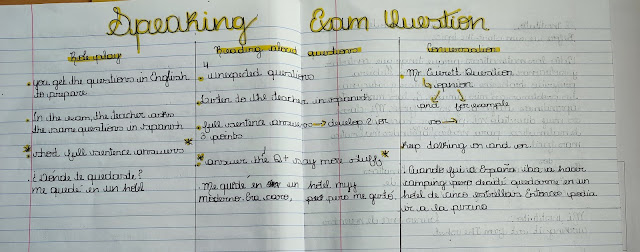Year 10 have been working on the three different types of questions for the new Speaking Exam. In this grid, they give 3 different answers to the question Where do you stay on holiday?
For the Role Play, the pupils are given the questions in the preparation period and can plan their answers. Then in the exam, they are asked these questions word for word, but in Spanish. They need to know to give a short sentence answer. (In my Y11 mocks this week for the old GCSE Speaking, many of my candidates were giving Role Play answers which were too long, and risked losing marks if they started making errors.)
In this case, the question is, "Where did you stay on holiday?" And the answer for the Role Play is "I stayed in a hotel." No need for any extra details unless the question specifies it.
The middle column is for the Unexpected Questions. In the AQA exam, these come after the Read Aloud text. They are on the same topic as the text, but are not questions about the text. This was one of the areas of the new exam that I particularly wanted to focus on. We know from the current exam that the unexpected question in the Role Play, and the 2 unexpected questions after the photo card are a challenge. The cognitive load of switching from prepared answers, to listening to a question from the teacher is a shock to the system. Then to process the question, either by picking up on a key word and hoping for the best, or by understanding every word... Then to think of an answer... And how to say it in Spanish... You can see pupils struggling. And in the new exam, there are 4 questions like this. And they are supposed to give developed answers.
So far, my class haven't panicked at the stage of dealing with understanding the questions. We've worked on it, and they are confident. What they struggled with at first was the full sentence answers. "Where did you stay on holiday?" Answer: "In a hotel." In your relief and pleasure at grasping the question, it's not natural to start the sentence again and say, "I stayed in a hotel." We have made progress on this.
By the way, for the role play at Higher Tier on the Sample Assessment Materials, there are past tense questions such as Where did you stay? The questions for the Unexpected Questions seem more along the lines of giving opinions, disadvantages, describing, saying what you do... The question Where did you stay? was chosen by my class for the purpose of this exercise.
And some of the Unexpected Questions don't seem particularly friendly for giving a developed answer. In the French SAMs there is Where is your school? So I am telling my students to:
1. Answer the question.
2. Say some more stuff.
 |
| Answer the question. Say some more stuff. |
It's not their fault if the questions are unhelpful. They have to say more in order to get the marks.
My school is in Dereham. I live in a village so I go to school by bus.
I am hoping that would count as a developed answer to Where is your school?
For the Conversation Questions, I would never ask Where is your school? Or How many maths lessons do you have? This isn't really a conversation. It seems to be more to do with testing if the pupils know question words like where and how many, which is all very well, but doesn't help them demonstrate they can meet the criteria for developed answers. You'll see their grid refers to a Mr E question.
I don't want my questions to be catching any pupils out. I want them to be a platform for them to show what they can do. So instead of Where did you stay on holiday? I would ask Do you prefer to stay in a hotel or a campsite? And when they answer (with an opinion and a reason), I would simply say, For example? And they would know to answer with a past tense example and develop it.
You can see in their grid, they have written to Keep talking on and on. It says: When I went to Spain I was going to go camping but I decided to stay in a 5 star hotel so I could go to the pool... The criteria for developing answers are less than for the current GCSE. And the word "narrate" has been removed from the mark scheme. But they have to talk for much longer on one topic than previously. So talking on and on is still going to matter!
We are going to come back to this grid regularly, and build answers suitable for the Role Play, the Read Aloud, and the Conversation. And of course we'll use that distinction when answering questions spontaneously in class. How's everyone getting on with all this? Let me know!








